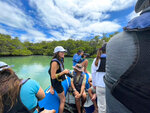
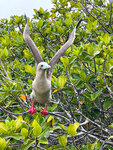
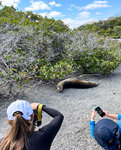
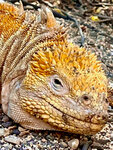
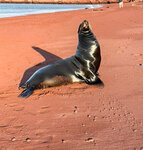
Early in 2022 Manchester’s Larry Lamb, a veterinarian and the Cricket’s “Pets & People” columnist, took a trip of a lifetime with his daughter to the Ecuadorian end of the Amazon Rain Forest and the Galapagos Island. He wrote an edition of Postcards Home for us, in which he described how his wonderous trip was cut short by illness. Well, in November, he returned to South America. Here is his postscript. Enjoy.
HOW DO YOU define a trip?
We travel for different reasons. We may travel to just go to a destination to relax. Or maybe to avoid the daily tumult of bad and irritating news, disasters and the ilk. Or to satisfy a basic desire to return to a less distracting environment. (This alone can assuage certain human needs—such as connecting with ourselves and perhaps defining personal priorities.)
Personally, I select a trip which may be challenging in ways that will change me and inspire learn ing something new about a people or place. The Galapagos Islands off the coast of Ecuador fulfilled those criteria. As a veterinarian, one of my biggest pleasures is the work I do with animals. Therefore, the option of journeying to their natural terrain where a human presence is carefully controlled by a government seemed like a good idea.
That said, I really had little idea how it would impact me, if at all.
Anyone can do a little research or go to YouTube and find a myriad of videos about travel to the various islands of the Galapagos. However, to me, the thing of greatest interest is trying to define the impact of the trip after returning home and evaluating the affect that the journey had.
Descriptions of a trip to the Galapagos usually come with the cliché, “a trip of a lifetime.” I am happy to say, that turned out to be relatively true. I was very lucky to have shared this trip with my daughter on a small ship with only 20 passengers, so anywhere would have been very cool. But the real treat and extraordinary experience was sharing the space with animal life.
What is different: there is more than enough space to live peacefully. And I felt that humans are not the top predator, and that felt great. The animals live and evolve with enough space to get their needs met, and humans have discovered how to get financial needs met through protection and stewardship.
The close proximity and trust of the animals is what this trip is all about. The Galapagos Blue Footed Boobie is a bird that best exemplifies that. This creature lives right before you, building a nest and raising her young unabashedly in your presence. They are singularly beautiful and have a gait that makes them endearingly goofy, thus their name, “boobie.” This is what is most unusual about being there and in fact, something you take for granted after a very short time. The actual impact on one’s senses is difficult to define but does add to the total affect being there has on you.
Snorkeling was great. The water was pristine clear in many locations and the exceptional part was the abundance of species and again, human presence was taken for granted. Swimming in the midst of sharks, side by side with a large turtle or seeing a marine iguana gracefully swimming were great experiences, but to swim among a thriving school of fish, to see healthy coral, to be reminded that with appropriate stewardship, this too could once again be possible.
Then, there were the Tortoises.
Their abundance was remarkable and being with them in their natural environment was special. The most memorable thing was seeing a young tortoise actually come up to us out of innocent curiosity. The older tortoises were stoic reminders of a species that would remember a time when their brethren were massacred but had somehow survived and with the conscious help of a people who appreciated their value as a historical reminder of an ancient past. We had an opportunity to visit these breeding centers and be inspired by the valiant dedication scientists have applied.
The iguanas were extraordinarily plentiful, colorful and fun to watch interact with each other. They live in various habitats on the islands. So plentiful in fact, that I had to be careful not to step on them. Once again, they were oblivious to human presence. On one hand, I saw what might be considered a herd of iguanas completely dominate a beach, to others that inhabited forested areas that had the appearance of colorful monsters. However, never was their presence menacing in any way. Our guides were the equivalent to professional photographers and taught us the value of getting down to eye level with all of these creatures in order to get the most striking pictures possible.
All of the above would have made this trip great. But one mammal stole the show—the Sea Lions!
Again, people were just part of their everyday world. Their personalities were on display, and after a while they just became part of your world. Peaceful, playful and downright spoiled (in a good way), they interacted with each other in harmony, rarely fighting, they just seemed to know the rules of civility among themselves. As far as we humans were concerned, we got used to taking a back seat.
Take that beautiful park bench. Forget it, that Sea Lion decided it would be a great place to take a nap. Applying my newly learned approach to photographing her close and at eye level, she actually barked at me; I got the hint and backed off right away. At the same time, standing close to one while she nursed her young was another memory firmly implanted in a plethora of fond memories taken home to cherish.
If you can imagine the cutest, most adorable canine face, the Sea Lion has that, and more. When you look at them, your heart melts. They are abundant and again just become part of your everyday reality. There is something about their presence that changes you. I will work on trying to define it, but for now, just happy it is there.
Seeing this experience as a psychedelic technicolor journey into a time and place where Eden lives on Earth, where humans can walk in harmony among animals in the wild and not be feared. This is happening in Ecuador. The country that took action towards an ecocentric influenced constitution, giving “Nature” legal, constitutional rights.
In recognizing nature as a capable and deserving rights-bearing entity, equal to humans, the country has figured out how to steward the islands of the Galapagos in a way that both animals and humans are getting their needs met. It’s a creative approach, with a legacy outcome.
I usually evaluate a trip in its impact on how I visualize my world. The first change I noticed came as I returned to our home in Manchester by the Sea from the airport. I appreciated the incredible beauty of where I live in a refreshed way. Waking up from dreams after returning home, I had a sense of still being on the islands. It was a distinct sense of peace, of being able to actually apply many aspirations taken with me and returning with them … fulfilled.
If I were to write a postcard home, one word would do: WOW.